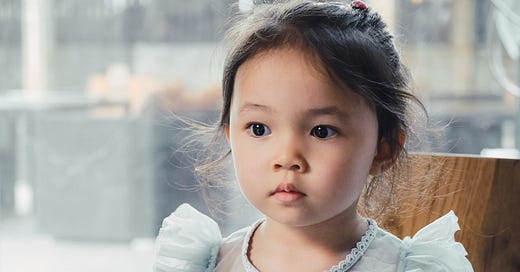Bright Horizons: Taking a Dim View of Girls
Diversity, equity, and inclusion (DEI) is big business these days, and even though we all know it does more harm than good, the industry is set to expand from an estimated $3 billion in 2020 to a whopping $17 billion by 2027. Those who want a piece of the action are vying for access to your children as close to in utero as humanly possible. Whether it’s drag queen ‘story time,’ demanding children accept 73 genders, schools encouraging 4-year-olds to ‘gender transition’ without parental consent, or ‘Maoist’ consultants ‘decolonising’ the minds of nursery school children by telling them they’re racist, the ‘woke’ Gestapo takes no prisoners.
Cue Bright Horizons, a £4.7 billion, U.S.-based company which runs 1,000 childcare facilities globally, and appears to be setting out its diversity stall in an already crowded marketplace. The company came to the attention of the British press over the weekend, when it was accused by a Kent mother of having a “left-wing campaigning agenda” and “dictating to parents their own political views on how to raise their children.”
A cursory glimpse at the company’s website and Twitter feed certainly suggests this is the case. Tweets such as “It’s never too early to talk to your child about race” are accompanied by ‘resources’ like “Important conversations about social justice for kids,” alongside the ubiquitous commitment to diversity, equity, and inclusion:
Bright Horizons stands unequivocally for diversity, equity, and inclusion, and against racism of all forms. Our vision is driven by our culture and our commitment to our customers and the communities in which we serve; and our progress is fueled by our HEART (Honesty, Excellence, Accountability, Respect, Teamwork) principles, measured to ensure accountability, and recognized with honors including Forbes 2021 Best Employers for Diversity, Bloomberg’s 2021 Gender Equality Index, and the Human Rights Campaign Foundation’s Corporate Equality Index.
The reason for the outrage, however, is a pamphlet entitled “Raising strong and confident girls,” which offers parents the following advice on “how we raise girls (children who identify as female)”:
1) Do not congratulate your daughter when she does well:
It is so easy to fall into a pattern of praising a girl’s appearance (“You look so pretty!”), labelling her behaviour as “good,” or congratulating her when she does something perfectly. Instead, embrace the concept of a growth mindset, and celebrate your daughter’s mistakes and failures.
2) Allow her to be obnoxious:
Parents may fall into a trap of calling an opinionated girl ‘bossy’ with a tone of disdain. However, those strong opinions are the budding leadership skills of a possible future CEO!
3) Force her to suppress her innate preferences:
Become aware of gender stereotypes presented in the media your family consumes. Fill your home with books, toys, and décor that do not conform to specific gender roles (e.g., buy books about female construction workers and encourage girls to engage in math and science activities).
4) Don’t call her ‘princess’:
Try to eliminate gender-based references to your child, such as ‘princess’ or ‘tomboy’ or phrases such as “Young ladies don’t behave that way.”
5) If you’re a father, make sure you adopt feminine traits:
Your daughter should see you doing household chores.
Bright Horizons is hardly the first company to attempt to profit from the demand for ‘woke’ nonsense, but these things do not always end well. ‘Get woke go broke’ as the saying goes, and it’s been a hard lesson for companies such as Ben & Jerry’s whose ice cream sales plummeted after they lectured the UK on illegal immigration, Gillette who took men to task for their ‘toxic masculinity,’ and Netflix who seem to have realised Meghan Markle isn’t quite the crowdpleaser they’d hoped for.
Moreover, the faddish ‘gender-neutral’ approach to parenting simply does not work—the science is clear on this. A recent meta-analysis of the literature confirms that, despite social pressure, children choose toys according to gender. This is echoed by how children choose musical instruments, with boys particularly resistant to intervention. Naturally, this translates in the workforce as the broad truth: Men prefer working with things, women prefer people.
The ‘gender is a social construct’ theory is nicely debunked by Dr. Debra Soh, a neuroscientist specialising in gender. She explains:
[People think] that gender is a social construct, that children when they’re born are blank slates, that they don’t have innate preferences with regard to gendered interests or behaviours, but that’s scientifically inaccurate.
Soh goes on to detail how it is factors before birth, rather than parenting practices, which exert the most influence on how children orient themselves in terms of gender:
It corresponds to how much testosterone a person was exposed to in utero. What we see is that higher levels of testosterone are correlated with more ‘male-typical’ interests and behaviours, and correlated with sexual attraction to females.
However, there is another side to the ‘woke’ agenda. More than just being plain wrong, it should not be the first priority of childcare to indoctrinate the young. One cannot help feeling that Bright Horizons would do better to focus on more traditional matters such as the happiness, health, and safety of their charges. Sadly, this was something they failed to do only last year, when a 10-month-old child choked to death after he was left to eat unsupervised.
Not many girls get the chance to be a princess in real life. Even the ones we have often fall chronically short of the standards one might hope to expect. But there is no evidence whatsoever that being called a princess by a loving father has any negative effect on young girls. In fact, I’d go so far as to say that any daughter notregarded as a princess in her father’s eyes is being denied something so fundamental that no amount of societal compensation could ever replace it.
This piece first appeared in The European Conservative, and is reproduced by kind permission.




